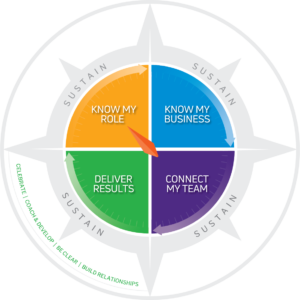MAKE MANAGERS YOUR DIFFERENCE MAKERS
Change is in the air. Your strategy is brilliant. Your people want to help the business succeed. Your customers are clamoring for more. So, what’s standing in the way of success? Believe it or not, it’s your managers.
Managers direct as much as 80 percent of your workforce, but they also account for 70 percent of the variance in employee engagement. Somewhere under that pile of to-do lists and behind those endless meetings they spend their time in is the potential to be real difference makers for your business – especially in times of change. Managers may be experts in technical or operational areas, but all too often the “people” part of their job – arguably the most critical part in times of change – is left to chance.
You may be wondering: What’s holding your managers back? Why aren’t they stepping up to fulfill the people part of their role?
The answer is simple: most managers have never developed these skills. But it’s not their fault. According to “America’s Workforce: A Revealing Study of Corporate America’s Most Neglected Employee” (Kelton, 2015), more than 62 percent of Talent Development Leaders admit they aren’t satisfied with the state of their manager development initiatives. That’s a pretty sad statistic given what we expect from managers. The very people who are tasked to oversee so many critical aspects of your business aren’t given the proper tools or knowledge they need to do their jobs. Still, it’s not for lack of trying. You would be hard pressed to find an organization that doesn’t offer development for managers.
So, why are so many companies missing the mark? There are four classic mistakes companies make with their manager development programs:
PROCESS OVER PEOPLE
Too many times, managers are trained exclusively on job-specific skills and processes – like how to complete a performance review or conduct an interview. While this knowledge is no doubt important for success, something essential is overlooked: the “people” part of the equation – in other words, leadership skills.
Take performance reviews, for example. The days of formal, annual reviews are over and companies now expect managers to have frequent touch points for feedback and development. The point is to have an open conversation with an employee about the past year and what’s next. Managers guide the employee to set development goals and together they determine the steps to achieve them. But a really effective performance touch point requires honest conversation, and that doesn’t happen if the manager hasn’t worked to develop a trusting relationship with the employee.
Coaching, goal-setting, relationship-building – all of these are “people” leadership skills managers must have to underpin important job-specific skills and processes, like performance touch points. Yet, they are often forgotten or undervalued in manager development curricula. In fact, the “America’s Workforce” study found that only a minority of manager training programs focus on building true leadership skills: only 46 percent address team management, only 35 percent cover coaching, and only 25 percent develop delegation capabilities. The trick is to take a balanced approach. Systems, processes, and functional training are important, but should be complemented with training that addresses leadership and people skills, too.

 ALL THE RIGHT INGREDIENTS, BUT NO RECIPE
ALL THE RIGHT INGREDIENTS, BUT NO RECIPE
Conflict resolution. Communication. Coaching. Building trust. Team building. Delegation. The list of skills a manager should have goes on and on. Organizations often believe the bigger the course list for managers, the better! The problem is that while these skill areas are essential for managers to master, focusing on single topics in isolation can be quite daunting. Managers who take one-off courses are left on their own to connect the dots and apply what they learned in the real world, which can feel like a leadership scavenger hunt. It’s like having all the best ingredients, but no idea how to put them together to make your dinner. Even the most studious managers put into practice only a paltry portion of the skills they amass from this approach – it’s simply not practical.
To be strong leaders in the real world, managers must know how to move seamlessly between these skills. The most effective companies thread these capabilities together in a comprehensive foundational program rather than through single stand-alone courses. With the right tools and opportunities to practice, managers can learn how to connect and leverage these capabilities with fluidity and ease. We need to make it simple.

 FAILING TO SEE ENGAGEMENT AS A CRITICAL SKILL
FAILING TO SEE ENGAGEMENT AS A CRITICAL SKILL
Perhaps the biggest and most common failing is not equipping managers with the know-how to inspire their teams and engage them in the business. Leaders can have great relationships, coach like a champion, and set crystal-clear goals – but if they don’t have the ability to engage their teams in the business, they fail to be effective every time. On the flip side, when managers know how to engage and inspire their teams and possess the leadership skills to deliver results, they can significantly accelerate results for your organization.
People don’t want to be managed – they want to be led. They want to be inspired and shown how the work they do matters. If your manager development program doesn’t help managers see themselves as Chief Engagement Officers (CEOs), you’re missing a key opportunity to propel your business ahead.
 CHECKING THE BOX TOO SOON
CHECKING THE BOX TOO SOON
Planning a high-impact manager development program can be exhaustive and costly. All too often, organizations expend all of their resources getting a program launched, and then move quickly to the next priority. But checking the box too soon is detrimental in the long run. A manager development program is a long-term investment in behavior change that needs proper care and feeding to really pay off.
The key to success is to begin with the end in mind. The program itself is the catalyst for change, but that change needs to be supported back in the realities of the daily work. Organizations that invest the time and take on the challenge of developing a sustainment system that fits well within their culture are able to reap the rewards.

CAN’T-MISS MANAGER DEVELOPMENT: THE FOUNDATION EVERY GREAT MANAGER NEEDS
Ensuring your manager development program avoids the four issues above is critical. But wait – there’s more! To best prepare your managers for their jobs, you need to ensure they walk away from your development program with the right foundation that empowers and readies them for all of the challenges that come with leading others. To best outfit managers with the tools they need, be sure your manager development program prepares managers to focus on four fundamental things:

KNOW THEIR ROLE
Managers must understand that their people are their #1 priority. It’s no longer about shining as an individual contributor, but about harnessing the talents of the team, inspiring and motivating them to deliver results. This mindset shift is absolutely critical for managers to make. It primes them to think and act differently about delegation and engaging the team.
ASSESS YOUR ORGANIZATION
Managers are more focused on everyday tasks than on developing people.
Managers often feel overwhelmed and struggle to prioritize.
Turnover is an issue for our organization.
If you can check any of the above, this is a strong indicator that your managers need to better understand their role in leading their people.
KNOW THEIR BUSINESS
Even if they are clear on the “people” part of their role, managers need to be grounded in all aspects of your business. Be sure they understand how your business operates and what your organization is working toward. They need a deep understanding of your company’s vision, strategy, and culture so they can guide their teams to act on what matters most. Your manager development program needs to help managers understand the business today and inspire them to continue honing that understanding as the business changes.

ASSESS YOUR ORGANIZATION
Our business is rapidly growing and/or changing.
We have a new strategy/set of goals that is critical to success.
We are working to change (or maximize) our existing culture.
If you can check any of the above, this indicates it’s a critical time for your managers to have absolute knowledge of the business. They are the voice of the front line and your success hinges on how well they are able to translate strategy into action.

CONNECT THEIR TEAMS TO THE BUSINESS
Managers must be able to connect their teams to the business – on both an intellectual and emotional level. Managers need to see themselves as CEOs (Chief Engagement Officers) for their teams and consistently connect the everyday work to the company’s larger overall goals. Your manager development program should give managers the know-how to engage and inspire their teams so employees feel like they’re adding value to the business.
ASSESS YOUR ORGANIZATION
Managers often fail to connect and communicate what the business is trying to accomplish with the role of their team/department.
Managers struggle to share information about the business with their teams in a compelling, meaningful way.
Employees are not always clear on how their daily tasks support what the business is working to achieve.
If you can check any of the above, it’s probable that your managers haven’t embraced their role as Chief Engagement Officers and lack the skills to effectively engage and inspire their teams. This can hinder performance and results at the team and company level.
DELIVER RESULTS THROUGH THEIR TEAM
Next, managers must couple the mindset, business knowledge, and ability to engage and inspire their team with the core leadership skills that ensure they can deliver results through their team. This includes developing habitual routines to:
- Build relationships based on trust and communication.
- Set clear expectations to get consistent and aligned results.
- Coach and develop for performance, in both everyday interactions and formal conversations.
- Celebrate wins and recognize team members, which strengthens relationships and maintains engagement.

ASSESS YOUR ORGANIZATION
Managers don’t feel confident or well-equipped with the leadership skills to deliver results through others.
Managers struggle to get their teams to go above and beyond base expectations.
Managers are inconsistent or ineffective at building relationships with or coaching their people.
If you can check any of the above, you likely need to help your managers embed these core leadership skills into their everyday routines. They need simple-to-follow models and tools they can apply practically and consistently in their day-to-day interactions with the team.

CRACKING THE CODE ON SUSTAINMENT
At this point, you know that incorporating sustainment initiatives into your program is critical – it’s the only way to ensure managers apply their new knowledge for the long term. Still, the “America’s Workforce” study tells us that a mere 18 percent of people responsible for manager training strongly feel that they’ve been successful at sustainment, and a whopping 67 percent don’t have strong faith that sustainment of manager training is even possible in their organization.
So, why do so many organizations struggle to succeed at sustaining manager development? It’s the same reason people who lose weight often gain it all back; they go about it the wrong way. They devote all of their time, attention, and energy to achieving the goal (losing the weight, launching the manager development program) and they fail to have real-world strategies to maintain that goal once it’s met. If you want to maximize the time, energy, and budget you’ve put into your management development program, there are a few steps you can take to ensure your managers embed the new habits over the long term.
- Get your senior leaders on board. If they’re supporting the program, others follow – after all, the leaders set the tone and are the ultimate role models for your organization. So make sure they understand the importance of the program and how developing great managers impacts the bottom line for the better.
- Gain commitment. A great manager development program inspires action. But inspiring action and taking action are not the same things. Back in the realities of their work, managers quickly slip back into old habits. To get the results you are after, view the program as the catalyst for change, rather than the end solution. Across the organization, managers must be accountable for change. They need to see how committing to new behaviors and creating new habits are critical to their success and the success of the business. Tout their success throughout the business – in newsletters, the company intranet, blogs, etc. – whatever means you have to celebrate people through your company’s culture.
- Make it as easy as possible for your people to change. It takes time, discipline, and repetition for new habits to form. Remove any barriers to change that might be in the way. For example, say your manager development program includes a new coaching model and you want people to start using it. When it’s time for mid-year performance reviews, update your forms to include the new coaching model. This sets everyone up for success – giving every manager the tools to practice the new model without fail.
Smart and effective manager development programs can be a challenge to create and even harder to sustain. It’s important to take a hard look at your manager development efforts and clearly identify what’s not working. Your program needs to arm managers with the knowledge and skills they need to become invaluable strategic assets to your bottom line. Otherwise managers will continue to underperform, their teams will falter, and the business will fall short of its strategic goals.

CHECKLIST FOR SUCCESS
Are you creating a manager development program? Use this list to help ensure your managers have what they need to lead the rest of your employees to success.
- Focus on hard skills and overlooked people leadership skills like coaching, goal-setting, and relationship-building. You can’t assume everyone knows how to establish the relationships that are essential to being a great manager. Or that your most impressive individual contributors know how to lead a team too. It’s your job to give them the knowledge to add “manager of people” to their list of skills.
- Don’t teach soft skills in isolation from each other. Take a real-world approach to designing training for your managers. While it may seem easier and more comprehensive to offer an extensive list of leadership courses for managers to choose from, in the end they are hard-pressed to practice, apply, and integrate those skills back on the job. A typical workday has managers drawing on many of these skills simultaneously, so make sure your program provides knowledge in a layered or interwoven manner. Not only do they need all of the right ingredients, they need the recipe for how to put it all together, too.
- Make engagement a cornerstone. And we don’t mean weekly ice cream socials. Managers need to understand how to engage their people in the business by making them feel connected to the big picture. If your managers know their role, know your business, and know how to connect their teams to the business, you’re in the clear. If your program doesn’t deliver this knowledge, you’re missing the mark.
- Give them the right foundation. Managers need to master the fundamentals and continually fine-tune their leadership practice. The best manager development programs give managers the know-how to engage and inspire their team and the core leadership skills to deliver results, such as building relationships, setting expectations, coaching, and celebrating their teams.
- Help people stay committed for the long term. We all know that changing behaviors is hard. You won’t see the results you want if you don’t hold people accountable and commit to sustaining what your program delivered. Make sure your leaders are on board. Make sure your managers bring what they learned to work each day. And make sure you’re enabling them by doing all you can to make the new behaviors easy to adopt.








